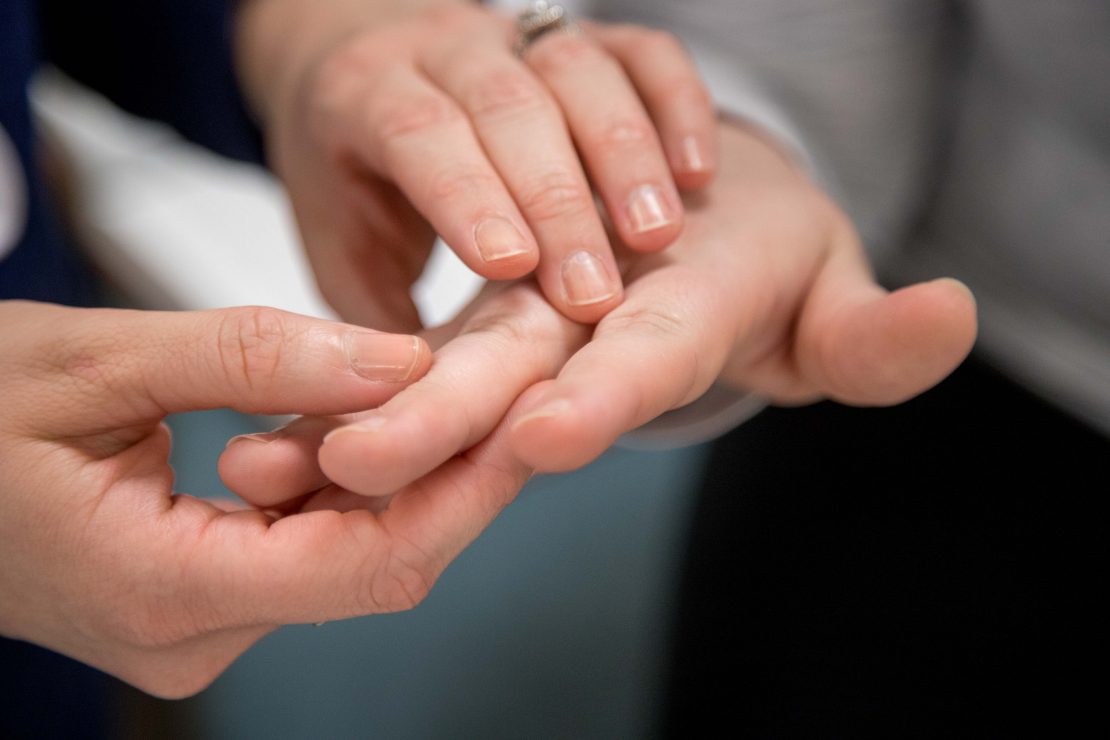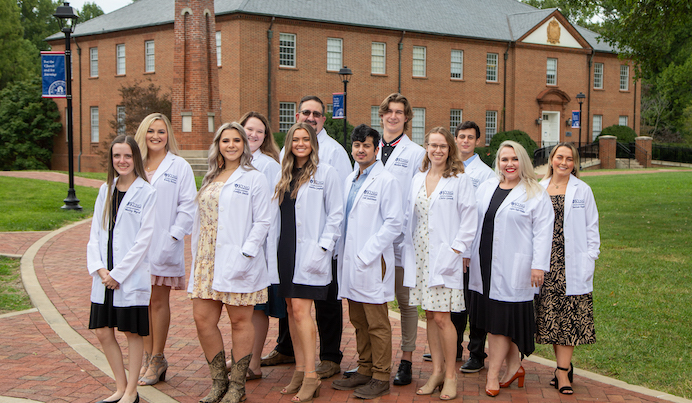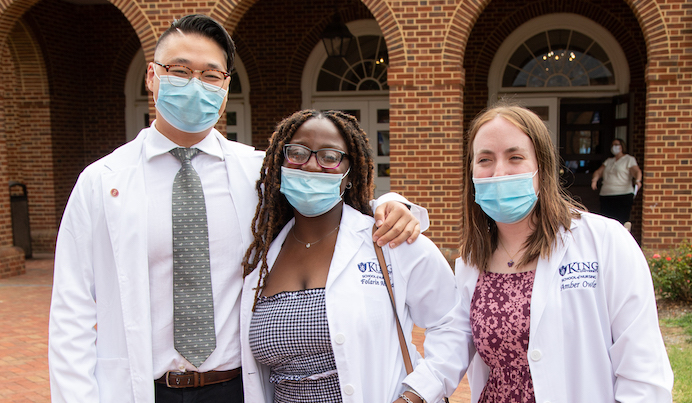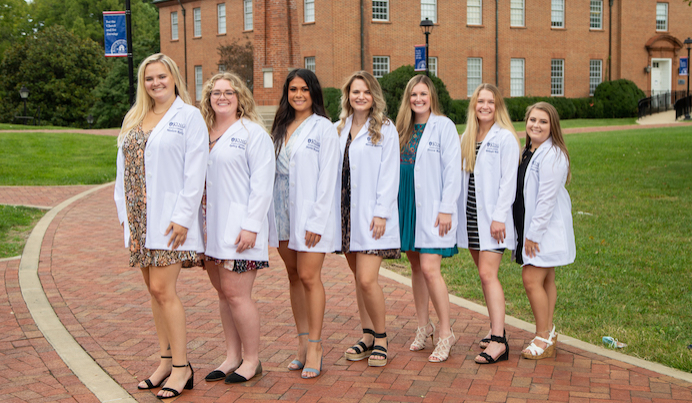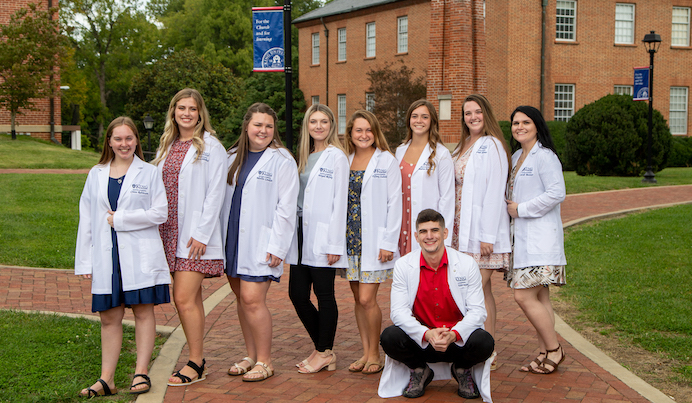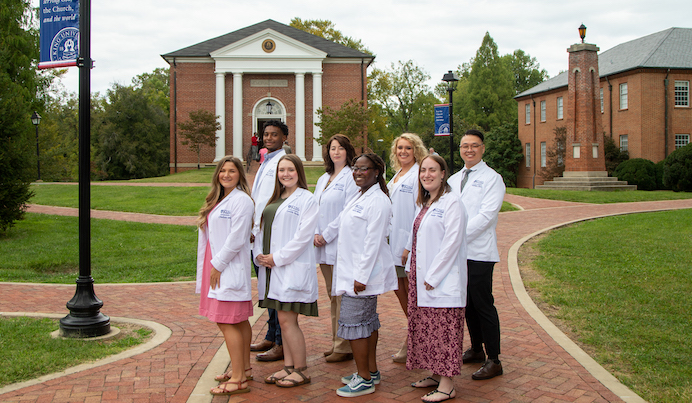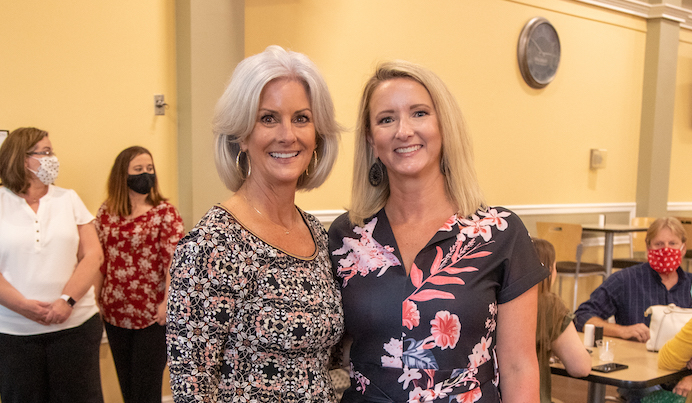Five Programs
Our Bachelor of Science in Nursing (BSN) program offers a baccalaureate degree to prelicensure nursing students. Our traditional nursing program can be completed in eight consecutive semesters (four years). The quality of King’s nursing program is evidenced by the significant number of our students who are recruited for key positions before they graduate. Many receive offers for positions from their first-choice employer. To learn more about the BSN program click here.
The BSN program is offered in the following format:
- On Campus
The Bachelor of Science in Nursing for Registered Nurses accelerated program provides a unique alternative to the traditional method of pursuing a bachelor’s degree. This program is designed as a transformational learning experience leading to personal and professional skill development to meet the needs of Registered Nurses previously prepared at the ADN or diploma level. To learn more about the RN-BSN program click here.
The RN-BSN program is offered in the following formats:
King University’s Master of Science in Nursing degree (MSN) prepares professional nurses for a specialty role in advanced nursing practice, leadership in the nursing profession, and future doctoral study. You’ll learn the advanced theoretical knowledge, research and practice skills needed to function in increasingly complex care settings. Within our MSN program, you may choose from several specialization areas, including Nursing Leadership and Administration, Family Nurse Practitioner (FNP), Psychiatric Mental Health Nurse Practitioner (PMHNP) and Pediatric Nurse Practitioner (PNP). To learn more about the MSN Program click here.
The MSN program is offered in the following formats:
- The Family Nurse Practitioner concentration is offered in the HyFlex format, which gives students the option to attend class in person, synchronously online , or asynchronously online
- The Psychiatric Mental Health Nurse Practitioner, Pediatric Nurse Practitioner, and Nursing Leadership & Administration concentrations are offered online
Tennessee residents who want to earn their MSN at King can now apply for the Tennessee Behavioral Pathways scholarship, which provides up to $30,000 in tuition aid over a two-year period. More details and the portal to apply are available here.
King University’s Doctor of Nursing Practice degree (DNP) prepares professional nurses in advanced nursing practice and leadership in the nursing profession. You’ll learn the advanced theoretical knowledge, research and practice skills needed to function in increasingly complex care settings. To learn more about the DNP program click here.
King also offers an eight-semester BSN-DNP program in a blended, online and in-person format.
The DNP program is offered in the following format:
- Online
Family Nurse Practitioner – Post-Master’s Certificate
The Post-Master’s Certificate program for the Family Nurse Practitioner (FNP) will serve students seeking post-master’s preparation in the FNP role. Applicants must have completed a MSN from an NLNAC or CCNE accredited program. This program, in addition to the student’s previous MSN education, will prepare for the advanced practice role specializing in primary care utilizing advanced theoretical knowledge and practice skills needed in complex care settings.
Psychiatric Mental Health Nurse Practitioner – Post-Master’s Certificate
The Post-Master’s certificate program for Psychiatric Mental Health Nurse Practitioner (PMHNP) will serve students seeking post-master’s preparation in the PMHNP role. Applicants must have completed a MSN from an accredited nursing program. This program, in addition to the student’s previous MSN education, will prepare for the advanced practice role specializing in providing mental health care utilizing advanced knowledge, skills, and therapeutic techniques needed in psychiatric healthcare settings.
Nurse Educator – Post-Master’s Certificate
The Post-Master’s Certificate for the Nurse Educator program meets the needs of students seeking postmaster’s preparation in the role of Nurse Educator. Applicants must have completed a MSN from an Academic Programs—Post-Graduate 188 NLNAC or CCNE accredited master’s nursing program. This program, in addition to the student’s previous MSN education, will prepare the student for the direct role of nursing education in a variety of settings, from clinical to academic.
To learn more about the Post-Master’s Program CLICK HERE.
The Post-Master’s Certificate program is offered in the following format:
- Online
- Family Nurse Practitioner – HyFlex
- Online
King’s quality nursing program is built on a holistic philosophy that promotes caring relationships and critical thinking. You’ll learn to:
- Promote diversity; social tolerance and justice; and personal, interpersonal, and professional development.
- Support mission work and an interdisciplinary process.
- Focus on the physical, spiritual, and intellectual dimensions of health.
- Develop key competencies to promote, maintain, and restore health through planned classroom and clinical experiences.
- Develop working relationships with faculty who are highly qualified as skilled practitioners and educators.
- Interact with classmates who represent a wide range of ages, backgrounds, and experiences.
You’ll apply classroom knowledge and gain hands-on experience through:
- Clinical experiences at area hospitals and community settings, where you will gain the skills and knowledge to care for a variety of patients with non-acute and acute illnesses.
- Research. You will learn techniques to research clinical problems and offer evidence based solutions to improve patient outcomes.
- The opportunity to participate in mission trips to Honduras, India, Brazil, and Italy, or opportunities in Washington D.C.
- Service learning by assisting in free health clinics, school systems, and community programs.
The School of Nursing programs are fully approved by the Tennessee Board of Nursing, and are a member of the American Association of Colleges of Nursing.
Students in the School of Nursing are eligible for membership in Sigma Theta Tau International Nursing Honor Society.
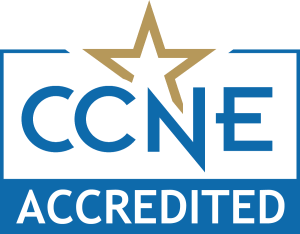
The baccalaureate degree program in nursing, master’s degree program in nursing and Doctor of Nursing Practice program at King University are accredited by the Commission on Collegiate Nursing Education (http://www.ccneaccreditation.org).
School of Nursing Mission, Vision, and Philosophy
We prepare students for professional nursing practice from the generalist level to advanced nursing practice in a Christian environment with academic rigor, while preparing professionals who are resourceful, accountable, and with a passion for serving God, community and society.
The vision of the school of nursing is to be recognized as a regionally respected, student-centric nursing program, steadfast in Christian commitment focused on academic excellence and graduating successful nursing professionals who will serve their communities.
The philosophy of the School of Nursing reflects our beliefs about the role and the education of the professional nurse at all levels, whether it is a generalist preparation at the baccalaureate level, the specialist focus at the master’s level, or the nurse who translates research into practice at the doctorate level. Our philosophy of nursing culminates from a comprehensive blend of nursing theories. Nursing serves society through the competent and compassionate delivery of direct and indirect healthcare services to individuals, families and communities, guided by Christian values.
Nursing is both an art and a science. The art of nursing includes the theories related to caring that promotes respectful relationships and individual worth. The science of nursing is based upon evidence obtained through research as well as effective interventions gained through experience, and with consideration of each individual or population.
In an uncertain and rapidly changing world, the professional nurse is a partner, provider, leader, and an advocate for consumers of health care in an increasingly diverse and aging population. As a professional discipline, nursing is based on a strong foundation of knowledge from the humanities, arts and sciences, and inter-disciplinary edification which together integrate academic and practice components. The professional nurse functions in a variety of roles addressing the incorporation of cultural, physical, spiritual, and intellectual dimensions of personhood and their influence on health and illness prevention. The nurse contributes a unique blend of knowledge, skills, and holistic care tailored to individual or population need. The professional nurse adheres to the code of ethics and laws that direct professional standards of nursing practice. Through planned learning experiences at all levels, students are set on a path for professional nursing practice.
Professional Pillars
The ability to walk morally upright in all actions and communications.
Let integrity and uprightness preserve me; for I wait on thee. PSALMS 25:21
The dedication and service to patients, the profession, collaboration, and continued learning while holding oneself to the highest standards of performance and accountability.
Finally, brethren, whatsoever things are true, whatsoever things are honest, whatsoever things are just, whatsoever things are pure, whatsoever things are lovely, whatsoever things are of good report; if there be any virtue, and if there be any praise, think on these things. PHILIPPIANS 4:8
Committing oneself to assist others to serve others and glorify God Placing others needs before thy own. Intentional actions that demonstrate a love for others in response to our love for God.
Each one should use whatever gift he has received to serve others, faithfully administering God’s grace in its various forms. 1 PETER 4:10
Making a decision based upon a knowledgeable understanding of the circumstances, acting on that decision, supporting the decision with evidence-based rationale and reason, and accepting responsibility for the outcome.
Create in me a clean heart, O God; and renew a right spirit within me. PSALM 51:10
A polite, respectful, and purposefully kind verbal and non-verbal interpersonal communications and behaviors.
And as ye would that men should do to you, do ye also to them likewise”. LUKE 6:31
The feeling of deep sympathy or sorrow for another who is experiencing perceived or actual challenges or suffering, with the desire to alleviate the suffering.
And be ye kind one to another, tenderhearted, forgiving one another, even as God for Christ’s sake hath forgiven you. EPHESIANS 4:32
Licensure, Certification, and Clinical Placements
Students who wish to license outside of the states of Tennessee or Virginia must contact the State Board of Nursing in the specific state to confirm the program meets licensure requirements. Students may contact the Program Coordinator or School of Nursing for additional questions or assistance.
Information for licensure requirements for each state Board of Nursing:
Regulatory requirements governing student clinical vary by state and are subject to change. Clinical placement outside of Tennessee is contingent upon approval by the appropriate regulatory bodies and will be evaluated on an individual basis with each clinical request. If clinical experiences are being requested outside these states, please contact the School of Nursing, your clinical instructor or program coordinator as soon as possible to discuss the request. Currently, placements are allowed in the following states: Tennessee, Virginia, West Virginia, Kentucky, South Carolina, Indiana, Florida, Ohio, and North Carolina
Students must hold a RN license (or enhanced compact state RN license with privilege to practice) in the state where clinical hours will be completed. A current, unencumbered RN license must be on file in the School of Nursing office for the entirety of the clinical experience.
